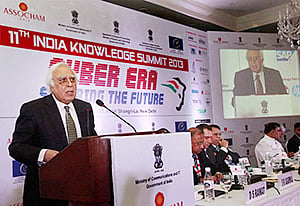
New Delhi : India is opposed to any control on internet in the name of cyber security, Telecom Minister Kapil Sibal said on Tuesday, reports PTI.
“We have an inter-governmental committee in the United Nations that is trying to seek to resolve this (cyber security) issue through some kind of government control which, I think, as a nation India must oppose. India can’t be part of controls on the internet,” he said while speaking at Assocham’s India Knowledge Summit here.
The Minister also opposed idea of a global body to allow the private sector control on internet space and said: “We can’t even let that happen because if the private sector controls it then there is no element of accountability and transparency. Where will we go to resolve our
issues?”
He expressed apprehensions that in future industrial houses or business organisations will have private armies to control information in the cyber space. “Industrial houses and multinationals are going to use cyber space to promote their products, services and the larger the cyber space occupied by private armie the more profitable that enterprise is going to be…We need to evolve principles on the basis of which we deal with cyberspace,” he said.
Sibal also sought to highlight positive sides of cyber space like digital interconnectivity that helped evacuate six lakh people before cyclone Phailin hit Odhisa and Andhra Pradesh three days ago.
Technology modernisation project carried out by Science and Technology Ministry in 2004 also helped in saving lives of lakhs of people (in Odhisa), he said. Sibal was heading the Science and Technology Ministry in the UPA government in 2004.
“It was because of buoys and digital interconnectivity we could figure out that there is going to be (Phailin) cyclone of this velocity and intensity. Before storm could hit us we got people 6 lakh people evacuated. It is because we realise the enormous power of digital,” he said.
On the other side, Sibal said, if nuclear installations of defence system in the country are hacked its results can lead to havoc. Sibal also raised the issue of disparity between developed countries and emerging economies that may lead to differences in cyber space and domination by developed countries in framing rules.
“There is going to be cyber divide between those nations who produced intellectual property (IP) and those nations who use intellectual property. Those nations who produce IP will lay down the rules of the game and those who use IP will recipient,” he said.
The Minister said that there are issues related to hardware which are generally made by countries in the West which also dominate technical standards.
“There is no server which is here (India). They are all housed in United States of America. They decide on what kind of information should be brought on the table and used by people across the world,” he said.
He called for global cooperation on evolving framework that does not impact positive aspects of Internet, guidelines that does not put governmental control on cyber space but accountability on user for equitable growth.
